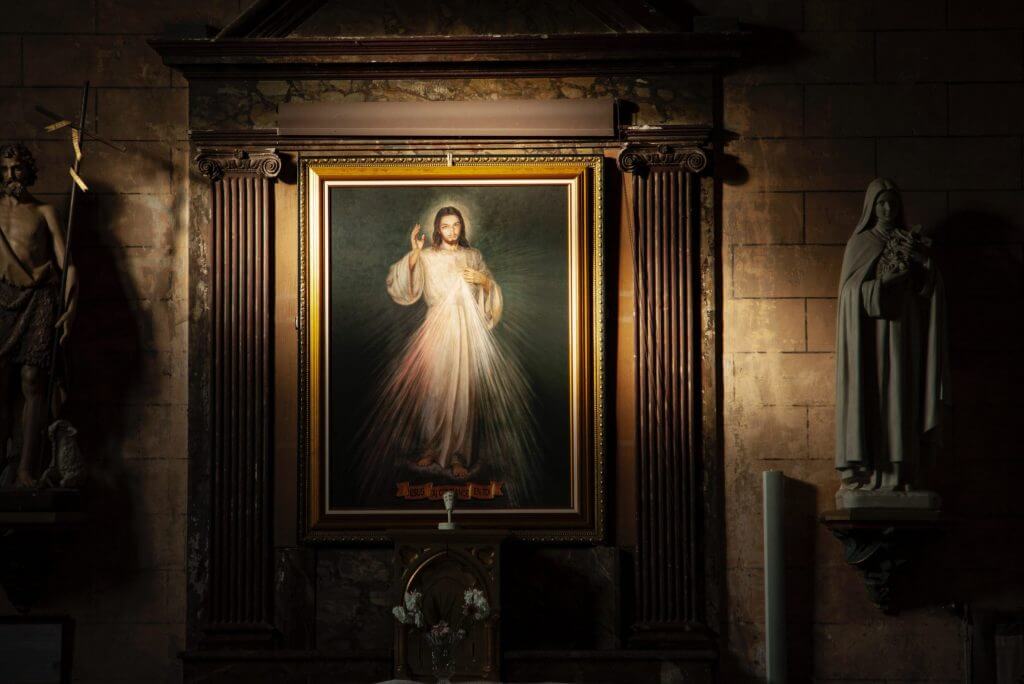We’re all looking for happiness.
That’s what drives our desire to find a good dating relationship, which will presumably lead to engagement and a happy marriage. On this Divine Mercy Sunday, let’s look at how the extraordinary spiritual life of St. Faustina Kowalska, as chronicled in the Divine Mercy Diary, can help us.
You might ask what a cloistered nun can teach about relationships. After all, surely it’s no knock on this great saint to note that she was called to a very different life than we are. That’s true. It doesn’t always work to make a linear connection between the life of St. Faustina and our own. But that doesn’t mean the creativity of the Holy Spirit can’t be at work in helping us apply her lessons to our own challenge. In fact, one might say that the growing popularity of the Divine Mercy devotion over the past forty years is a sign that such holy creativity is exactly what God is calling us to.
And St. Faustina most definitely was in a relationship, as a bride of Christ.
To read her diary is to read the strivings of one who knew that relationship with extraordinary intimacy and was frequently having to admit she was wrong. All of which makes her a valuable guide for us today.
We’ve been conditioned by Hollywood to have certain expectations of relationships, both in how they come about and what they’ll be like. Even if you set aside obvious violations of the Sixth Commandment, it’s still easy to be influenced by the ease and romanticism that seem to define relationships in television and film.
The life lessons of St. Faustina can take that false romanticism and rip it out. Her relationship with Christ was marked by frequent trials, misunderstandings, and physical pain. We’re not talking only about the pain of tuberculosis that eventually took her life at age 33. But the mental anguish that came with the misunderstandings she endured from her fellow sisters.
In these struggles, we see something about what life in community is like.
Certainly, there were a lot of joys for St. Faustina in the convent, starting with the support she got from her Mother Superior and her spiritual director, Father Michael Sopocko.
But there were also a lot of misunderstandings. Her fellow nuns accused her of being lazy and delusional. There were priests whom she confided in about her visions that put up a wall of disbelief. Yet, she persisted.
Dating relationships change our own community.
There’s the whole new social circle we meet in the friends and family of our significant other. Our relationship with our own original community of family and friends changes. Fear of being accepted is often a significant worry for both people in a relationship. Where there is fear, the Adversary will be prowling, looking to turn it against us.
And that’s just the fear that can come from the change in community. We haven’t even talked about the countless ways couples annoy each other after the early glow of the relationship wears off and the hard work of building a life together begins.
St. Faustina teaches us to persevere.
Whatever trials she went through were worth it because she loved the one she was with. She knew that she was not made for this world. Her teaching is a good reminder to have realistic expectations about how much happiness any one person can bring us, how much happiness can be achieved this side of Heaven, and then to preserve anyway—and through that acceptance comes happiness beyond our understanding.
The lessons contained in the Divine Mercy Diary also emphasize the extraordinary value that’s found in little things done with great love. At one point (Notebook #65), St. Faustina is draining water off the potatoes when something extraordinary happens. She writes, “I saw there in the pot, in the place of the potatoes whole bunches of red roses, beautiful beyond description…I heard a voice within me saying ‘I change such hard work of yours into bouquets of most beautiful flowers…their perfume rises up to My Throne.’”
In a relationship, it’s great to do something dramatic and special, like a fancy evening out. But limits of time and money make that an occasional thing. The real work of a relationship is the countless little things you do for the other person, from running an errand for them, to doing the dishes, to other unpleasant tasks your significant other might need help with. What’s your version of draining the potatoes? If it’s done with great love and not with complaining, it has eternal value.
“Great love can change small things into great ones, and it is only love which lends value to our actions. (Notebook #303)
A model of patience.
If there’s anything someone looking for their significant other can understand, it’s frustration with the pace at which God works.
As human beings, we want things fast and the era of the Internet has conditioned us all to want it faster. Very early in St. Faustina’s vocation, she was given the opposite advice. A confessor told her (Notebook #473)—“My daughter, arm yourself with great patience; if these things come from God, they will be realized sooner or later. So be completely at peace.”
Complete trust in God also comes with the understanding that we will follow His will and take the required action. If St. Faustina never stepped out and took the risk of telling someone else what was happening with her and the Lord, we would not have this amazing spiritual treasure today. And even in the little things of daily life, she was always rewarded for stepping out.
There’s one morning when she decides to go into the garden to make her meditation (Notebook #1705). Christ Himself stood before her and asked why she was out so early. St. Faustina said simply that she was looking for Him. Our Lord’s answer? “I have come out to meet you, to lavish new graces on you. I am looking for souls who would like to receive my grace.” All St. Faustina had to do was step out in faith.
When it comes to relationships, a lot of us know plenty of frustration.
We probably have stepped out in faith a lot. Whether it’s getting active on CatholicMatch and contacting people, going on dates, and for a lot of us, even getting into what proved to be a sacramentally invalid marriage, we know more about failure than we’d care to admit. And it can become easy to second-guess ourselves.
If the second-guessing ever goes along the lines of thinking that God gave you the right person, but you blew it, stop that immediately. Maybe you really did make mistakes and maybe those mistakes were deal-breakers. But if that’s the case, then the only reason you were ever in that relationship to begin with was to learn that particular lesson.
God isn’t looking to crack down on us for every time we might misread His Will. He only wants us to try and seek that holy Will to begin with. And He tells St. Faustina this directly, saying “I permit these adversities in order to increase…merit. I do not reward for good results but for the patience and hardship undergone for my sake.”
If you’re still struggling, take further heart from this call Jesus gave to St. Faustina—“Daughter, give Me your misery, because it is your exclusive property.” How’s that for a humbling reminder? It’s great to offer back to God the gifts we have—but that’s just returning what was His to begin with. Our miseries are our own and He still wants them offered to Him.
So focus on the little things, step out in faith, offer up your misery, and don’t second-guess yourself over past mistakes. That’s not bad dating advice from a nun who spent her entire adult life in a cloister.




